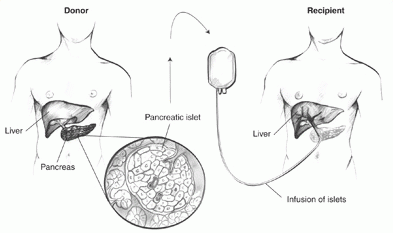What is Islet Transplantation?

Islet transplantation is an experimental procedure that involves removing and purifying islet cells from an organ donor’s pancreas and then infusing them into the liver of a patient with type 1 diabetes. Once in the liver, the transplanted islets are able to produce insulin in response to the body’s sugar levels.
As with other organ transplants, islet transplant recipients must take immunosuppressive (anti-rejection) medications for the rest of their lives. Anti-rejection medications suppress the immune system’s ability to attack the donor cells that have been transplanted into the patient’s body. Islet cell transplantation is a promising treatment for type 1 diabetes, as it offers a means of restoring the body’s natural ability to produce insulin and control blood sugar levels.
What Are Islet Cells?
The “islets of Langerhans” are small clusters of cells in the pancreas that produce a variety of hormones including insulin. In type 1 diabetes, the cells that make insulin (“beta cells”) are destroyed by the immune system. Individuals with type 1 diabetes must test their blood sugar levels frequently and take multiple insulin injections every day or use an insulin pump to survive. However, insulin treatment may not adequately control blood sugar levels in some patients. Uncontrolled blood sugar can lead to the development of short- and long-term health problems, including severe low blood sugar episodes (hypoglycemia), heart disease, kidney failure, blindness, unconsciousness or even death.
Why Get An Islet Transplant?
The primary goal of islet transplantation is to eliminate episodes of hypoglycemia and achieve good overall blood sugar control with little or no insulin injections.
Benefits and Risks of Islet Transplantation
For patients with type 1 diabetes complicated by frequent hypoglycemia and/or hypoglycemia unawareness, islet transplantation offers:
- Fewer low blood sugar episodes
- Potential reduction of insulin requirements or insulin independence
- Overall improvement in blood sugar control
However, there are also risks to islet transplantation.
- There are risks from the procedure such as bleeding, infection and reactions to medications.
- Patients will need to take two or more immunosuppressive medications for as long as the transplant works. These medications have various unpleasant and potentially dangerous side effects.
Other Things You Should Know About Islet Transplantation
- Most patients do not achieve insulin independence immediately, although their daily insulin dose may be lower.
- Many patients require up to three islet transplantation procedures to achieve consistent blood sugar control.
- While most patients achieve insulin independence for several months to several years after transplant, many patients lose islet function over time. Therefore, islet transplantation may not be a permanent solution.
- Patients will still need to continue to test blood glucose frequently.
Image courtesy of NIDDK at nih.gov.